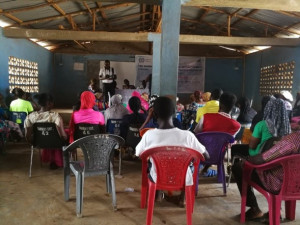By Alvin Lansana Kargbo
In a concerted effort to combat gender-based violence and improve access to clean water, the Sierra Leone Employers Federation (SLEF) spearheaded its second awareness-raising campaign on Friday, May 3rd, 2024, in the Mayenkineh Community, Calaba Town. The campaign, which was part of the ‘Women for Water and Peace Project,’ aims to promote decent work, enhance grievance handling through social dialogue and build the capacity of women in the water kiosk business.
The ‘Women for Water and Peace Project’ is nearing completion in the Mayenkineh Community, thanks to collaboration with various implementing partners, support from the International Labour Office, and funding from the UNCDF and UN Peacebuilding Fund. The project focuses on constructing water wells to provide purified water, addressing water scarcity challenges, particularly affecting women and girls.
Albert Ojo Collier, Executive Secretary of the Sierra Leone Employers Federation, emphasized the life-changing impact of the project on the community. He urged residents to view the project as a business opportunity for community development, highlighting the role of women in its success.
He underscored the significant role of women in water-related activities, noting how water scarcity exposes them to risks like physical violence and sexual exploitation during late-night water fetching. He expressed confidence that the project would mitigate such challenges while stressing the community’s responsibility to maintain the facilities for sustained impact.
Memish Doherty, representing the Sierra Leone Employers Federation, highlighted the importance of women’s involvement in the water project and its potential to empower them within their households. She emphasized the project’s role in alleviating the burden of water-fetching on women and urged community residents to take ownership of the wells for proper maintenance and transparent fund handling.
The ‘Women for Water and Peace Project’ signifies the commitment of the Sierra Leone Employers Federation, the International Labour Office, and other partners in addressing pressing issues faced by women and girls in accessing water resources. As the project progresses, it is expected to bring lasting change and contribute to the overall development of the communities involved.





